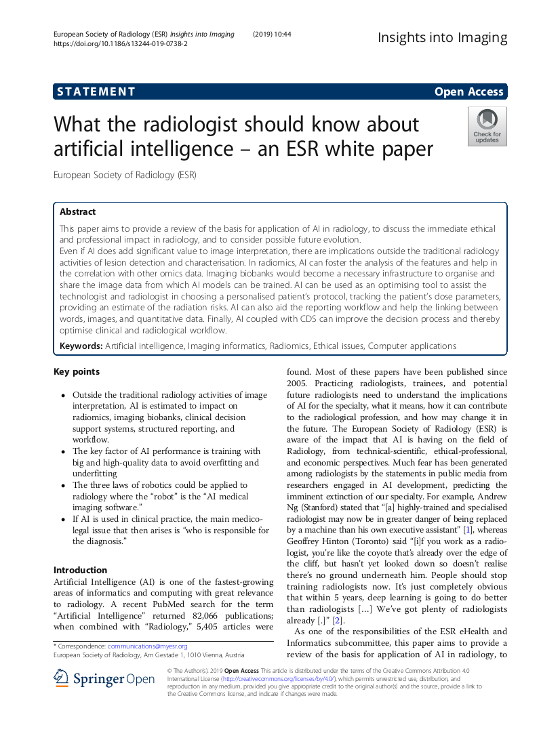 This paper aims to provide a review of the basis for application of AI in radiology, to discuss the immediate ethical and professional impact in radiology, and to consider possible future evolution. Even if AI does add significant value to image interpretation, there are implications outside the traditional radiology activities of lesion detection and characterisation. In radiomics, AI can foster the analysis of the features and help in the correlation with other omics data. Imaging biobanks would become a necessary infrastructure to organise and share the image data from which AI models can be trained. AI can be used as an optimising tool to assist the technologist and radiologist in choosing a personalised patient's protocol, tracking the patient's dose parameters, providing an estimate of the radiation risks. AI can also aid the reporting workflow and help the linking between words, images, and quantitative data. Finally, AI coupled with CDS can improve the decision process and there by optimise clinical and radiological workflow.
This paper aims to provide a review of the basis for application of AI in radiology, to discuss the immediate ethical and professional impact in radiology, and to consider possible future evolution. Even if AI does add significant value to image interpretation, there are implications outside the traditional radiology activities of lesion detection and characterisation. In radiomics, AI can foster the analysis of the features and help in the correlation with other omics data. Imaging biobanks would become a necessary infrastructure to organise and share the image data from which AI models can be trained. AI can be used as an optimising tool to assist the technologist and radiologist in choosing a personalised patient's protocol, tracking the patient's dose parameters, providing an estimate of the radiation risks. AI can also aid the reporting workflow and help the linking between words, images, and quantitative data. Finally, AI coupled with CDS can improve the decision process and there by optimise clinical and radiological workflow.
This paper was prepared by Prof. Emanuele Neri (Chair of the ESR eHealth and Informatics Subcommittee), Prof. Nandita de Souza (Chair of the ESR European Imaging Biomarkers Alliance - EIBALL Subcommittee), and Dr. Adrian Brady (Chair of the ESR Quality, Safety and Standards Committee), on behalf of and supported by the eHealth and Informatics Subcommittee of the European Society of Radiology (ESR).
The authors gratefully acknowledge the valuable contribution to the paper of Dr. Angel Alberich Bayarri, Prof. Christoph D. Becker, Dr. Francesca Coppola, and Dr. Jacob Visser, as members of the ESR eHealth and Informatics Subcommittee.
The paper was approved by the ESR Executive Council in February 2019.
Download: What the Radiologist should Know about Artificial Intelligence - An ESR White Paper (.pdf, 546 KB).
Download from eHealthNews.eu: What the Radiologist should Know about Artificial Intelligence - An ESR White Paper (.pdf, 546 KB).